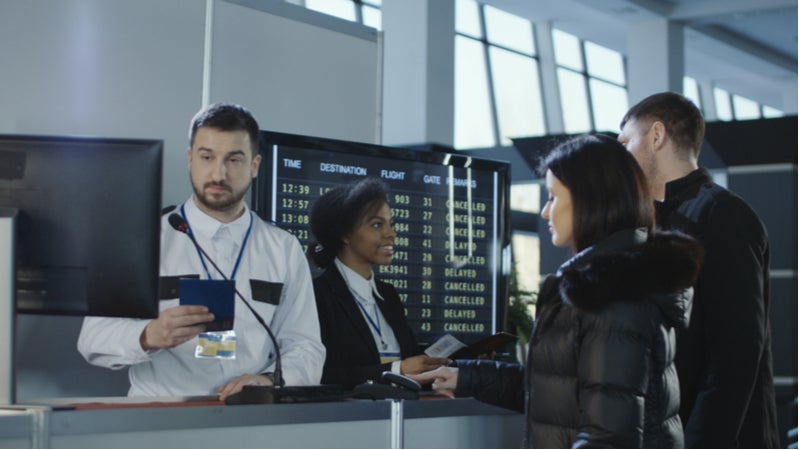Airports and airlines are ploughing ahead with new technology despite privacy and safety concerns from critics.
Biometric screening at airports/airlines
Ljubljana Airport in Slovenia recently trialled biometric boarding in partnership with Amadeus, a leader in travel technology. Passengers enrolled by taking a selfie on the Amadeus smartphone app to sit alongside their passport photo on a remote server.
Once a passenger arrived at the gate, another photo was taken for comparison before letting the guest board the plane. The technology meant that boarding time was reduced by 75%, a valuable reduction for such a time-consuming process.
E-Passport gates are already used in many airports and have progressed in effectiveness significantly of late. Despite initial uneasiness about the technology, travellers now accept the gates as a normal part of immigration.
Between 2018 and 2022, 77% of airports and 71% of airlines are planning trials or full rollouts of biometric scanning systems, according to SITA, a Swiss IT company that builds airport tech.
Hartsfield-Jackson Atlanta International, LAX, and JFK are among 15 US airports currently testing the technology with airline partners such as Lufthansa, British Airways and Delta.
How well do you really know your competitors?
Access the most comprehensive Company Profiles on the market, powered by GlobalData. Save hours of research. Gain competitive edge.

Thank you!
Your download email will arrive shortly
Not ready to buy yet? Download a free sample
We are confident about the unique quality of our Company Profiles. However, we want you to make the most beneficial decision for your business, so we offer a free sample that you can download by submitting the below form
By GlobalDataDelta is already using fingerprint and eye scanning technology to let members into its ‘Sky Clubs’; car rental company Hertz also plans to roll out biometric screening at 40 airports in the US.
Passengers are rightly apprehensive about the new technology
Google and Facebook have already come under fire for using facial recognition software; numerous police forces are also using the technology. The dislike of this technology is so rampant that in May 2018, San Francisco became the first major US city to ban facial recognition by the police and other authorities.
For some, biometric data is hugely personal and by storing it, a violation of privacy is taking place. There are also fears about data misuse and hacking, especially as biometric data cannot be changed like a traditional password.
Jan Krissler, a professional hacker, has easily circumvented fingerprint technology and facial recognition in the past. Biometrics is an exciting advancement in technology but the reality is that it may not be secure enough to be used at airports. Yet no matter how fast technology progresses, hackers are usually not far behind.
Despite the benefits, airports must ensure passengers can opt out
While some passengers may not worry about the dangers of biometrics as long as their airport experience is enhanced, there will be those completely against it.
Without the option to opt out, passengers may be put off completely by air travel so companies need to ensure they are not alienating their passengers by forcing this technology upon them.










Related Company Profiles
Meta Platforms Inc
Amadeus S.A.S.
Delta Corporation Limited
Google LLC
SITA NV